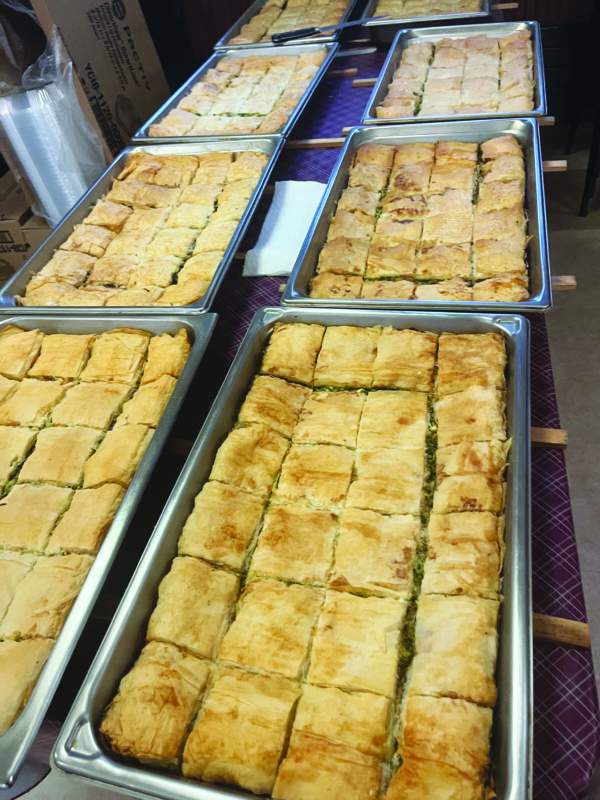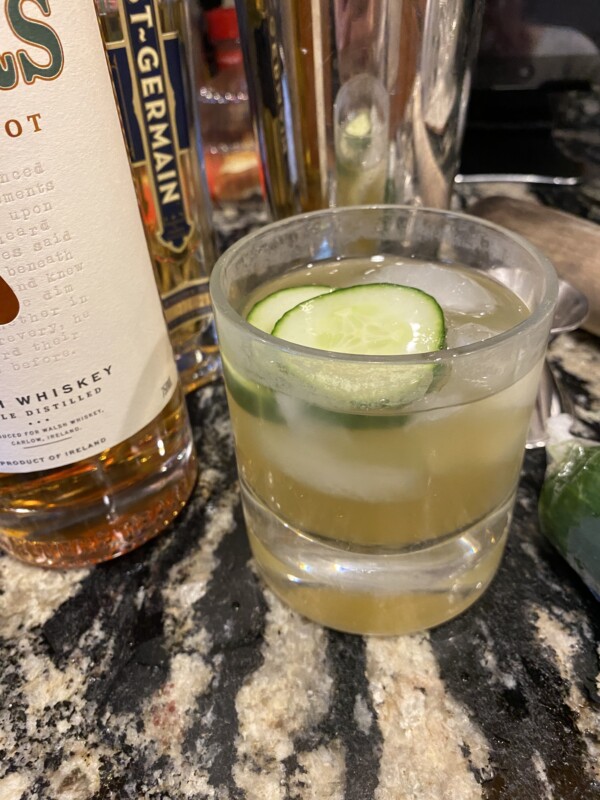A celebration of German-style beers and eats
A traditional celebration of beer in Munich, Germany, Oktoberfest has been held each fall since 1810, and it has been adopted by many American breweries and brew pubs. Oddball Brewing in Suncook will hold its first Oktoberfest on Saturday, Oct. 12. For co-owner and brewer Joe Friolet, that means focusing intensely on the beer.
“We do a Märzen-style Oktoberfest,” he said. “That’s more of your traditional style.” Märzen is a pale, traditional, Munich-style lager. Friolet describes it as “still malty and flavorful — just an easy-drinking, full-bodied Oktoberfest.”
While it might be tempting to play around with a Märzen, to try infusing it with fruits or spices, Friolet said that would not be in the proper Oktoberfest spirit.
“The Germans are very purist, “ he said. “They don’t like fruit or anything else added to their beer besides yeast, water, hops and barley.” The oldest food purity law in history, Munich’s Beer Purity Law, enacted under Wilhelm IV in 1516, limits the ingredients allowed in beer to water, barley malt and hops. (The law was relaxed slightly in the 1800s to allow yeast.) “A fruited sour beer would not be a thing that would happen in Germany,” Friolet said. “The Märzen just spoke to us; it was more of the classic style.”
Oddball has saved its whimsy for another fall beer, its Built Gourd Tough Pumpkin Spiced Ale. “It’s based off of a pumpkin pie,” Friolet said. “So it comes in around 9.5 percent [Alcohol By Volume, or ABV]. It’s got real pumpkin in it and it’s roasted with brown sugar. There’s a little lactose for sweetness for the whipped cream aspect. It’s got some graham cracker malt and it also has some spices, so, you know, like your cinnamon and molasses for extra flavor.” While it isn’t an authentic Munich-style Oktoberfest beer, it is very Octobery.
While Oddball Brewing is just starting to celebrate Oktoberfest, the Mile Away Restaurant in Milford is reaching the end of an era. After more than 50 years, the restaurant and event venue will close permanently at the end of September, and its yearly Oktoberfest Dinner on Oct. 6 will be its last meal.
“This is our largest outdoor event to the public every year,” said Kyle Altman, the Mile Away’s general manager. “This year is going to serve not only as our final Oktoberfest but kind of a farewell to the Mile Away since the property was just sold to a charter school.”
Altman said that the restaurant’s connection with Oktoberfest and all things Teutonic goes back to the 1960s. The Mile Away was originally started by two men from Switzerland, Ernst Kell and Joe Zund.
“Because of the heavy Swiss influence, there was a lot of German atmosphere to the whole restaurant and German food,” Altman said. “When it was purchased by the Murphy family from the original owners in 1996, Kevin and Sandy Murphy had actually just come back from teaching overseas in Germany for two years. So it was a natural fit to start doing an Oktoberfest as a kind of an end to the wedding season.”
Oktoberfest has always been one of the high points of the year for the Mile Away.
“It’s always been this big blowout,” Altman said, “because it’s a completely outdoor event. We have three bars, we have authentic German food, and we have special beer that’s made in Germany that we’re the only ones in the state of New Hampshire that can receive this beer. We have to order it months and months in advance. There’s a live tuba band, people are always encouraged to come in traditional Bavarian lederhosen and all the staff dresses up. It’s the largest outdoor event that the Mile Away does every year.”
Upcoming Oktoberfest celebrations
• The Hop Knot (1000 Elm St., Manchester, 232-3731, hopknotnh.com) will have a rotating series of seasonal beers (Oktoberfest, festbiers, Marzens, pumpkin, ciders, etc.) from various breweries around New England.
• Daydreaming Brewing Co. (1 1/2 E. Broadway, Derry, 965-3454, cask.life/daydreaming-brewing-co) will have German Schwarzbier on as well as Marzen available throughout September and October. Daydreaming will also hold a 16-line tap event at Cask & Vine (1 E. Broadway, Derry, 965-3454, cask.life/cask-and-vine) with 12 Weihenstephaner beers and four additional Oktoberfest beers, along with a stein hoisting qualifying competition that runs the entire month of September, followed by an elimination round and finals into October. $25 gets you entry into the competition, a commemorative liter stein and a liter of any of the 16 options on draft.
• Samuel Adams Brewing (samueladams.com) and Dover restaurants will present the 16th Annual Dover Oktoberfest Saturday, Sept. 28, 11 a.m. to 3 p.m. in downtown Dover. Tickets are available at participating bars for $20. Visit facebook.com/DoverOktoberfest.
• Join Talespinner Brewery (57 Factory St., Suite B, Nashua, 318-3221, ramblingtale.com) for its third annual Oktoberfest gathering, Saturday, Sept. 28, from 1 to 5 p.m. in its new outdoor Biergarten (weather-dependent). The afternoon includes a stein-holding competition, German spelling bee, costume contest and more. Rambling House Food & Gathering will be serving brats and pretzels to pair with TaleSpinner brews. This is a 21+ event.
• There will be an Oktoberfest Polka & Pints Pub Crawls in Nashua, Manchester and Concord, Saturday, Sept. 28, from 4 to 11 p.m. Visit Pubcrawls.com.
• Henniker Brewing Co. (129 Centervale Road, Henniker, 428-3579, hennikerbrewing.com) will hold a four-day celebration of Oktoberfest, Thursday, Oct. 3, through Sunday, Oct. 6. There will be a special Oktoberfest menu, trivia, stein-holding, barrel-rolling, stein-racing, yodeling, pretzel-tossing, live music and more.
• There will be a Fall Fest Block Party at 603 Brewery (42 Main St., Londonderry, 404-6123, 603brewery.com), Saturday, Oct. 5, from noon to 9:30 p.m. The party will take over Main Street with food trucks, live music, a stein holding contest, axe throwing, 603 Scratch Kitchen specials and more.
• Celebrate Oktoberfest at the Mile Away Restaurant (52 Federal Hill, Milford, 673-3904, mileawayrestaurantnh.com) with the Tubafrau Hoffbråu Band, Sunday, Oct. 6, from 12:30 to 5:30 p.m. Dinner plates with German specialties like sauerbraten, schweineschnitzel and jaeger chicken with German side-dishes are $20. Event is cash-only; there is a $20 per car parking fee.
• Long Blue Cat Brewing (298 Rockingham Road, Londonderry, 818-8068, longbluecat.com) will participate in two Oktoberfest events this season. One is an Oktoberfest Celebration, Oct. 12, from noon to 10 p.m. at Fody’s Tavern (187 1/2 Rockingham Road, Derry, 404-6946, fodystavern.com), with Oktoberfest activities as well as beer and food. Long Blue Cat will also have an Farm Day/Oktoberfest event at Little Red Hen Farm (85 Norris Road, Pittsfield, 568-5540, littleredhenfarm.net) on Oct. 19. There will be a food truck, a beer tent and local vendors with New Hampshire-made crafts and food for sale and to sample. There will also be farm tours and petting.
• The White Mountain Octoberfest will be held Oct. 12 through Oct. 14 at Loon Mountain Resort (60 Loon Mountain Road, Lincoln, 745-8111, loonmtn.com). This three-day festival is the region’s largest celebration of German food, drink and music. There will be beer, live oompah bands, axe throwing, pretzel necklace-making, keg-tossing, stein-carrying and more. Admission is free. Visit loonmtn.com/events/oktoberfest.
• The New Hampshire Brew Fest (nhbrewfest.com) is Saturday, Oct. 12, from 1 to 4:30 p.m.. Held on the grounds of Cisco Brewers Portsmouth (35 Corporate Drive, Portsmouth, 380-7575, ciscobrewersportsmouth.com), New England craft breweries and food trucks will gather to raise money for the Prescott Park Arts Festival and the New England District of the Master Brewers Association of Americas. Admission includes entry to the session specified on individual tickets, beer samples and live music and festivities. Food is available for purchase. VIP tickets are $80 with noon access. General admission tickets are $60, with access at 1 p.m.. Designated driver tickets are $20 and include entry, food and non-alcoholic drink vouchers. Taps-down occurs at 4 p.m.
• Oddball Brewing (6 Glass St., Suncook, 210-5654, oddballbrewingnh.com) will hold its first Oktoberfest Saturday, Oct. 12, from 2 to 9 p.m., with beer specials, food specials like bratwursts and pretzels, and a stein hoisting competition. Live music from 4 to 6 p.m.
• Rockingham Brewing Co. (1 Corporate Park Drive, Unit 1, Derry, 216-2324, rockinghambrewing.com) will host its annual Steinfest on Saturday, Oct 12, from 1 to 8 p.m. There will be four German-style beers on tap, available in one-liter stein pours. There will be a men’s & women’s stein hoisting competition and Teenie Wienies Food Truck will be there with German-style Bratwurst.
• The New Hampshire Ski Club (nhskiclub.org), will hold an Oktoberfest Schussbomb on Saturday, Oct. 26, from 6 to 11 p.m. at the Sweeney Post American Legion, 251 Maple St., Manchester. Come dressed in Octoberfest clothing with a chance to win a prize for the best costume. Doors open at 6 p.m., and dancing starts at 7 p.m. Tickets are $25.
• The Mile Away Restaurant’s(52 Federal Hill, Milford, 673-3904, mileawayrestaurantnh.com) Oktoberfest on Sunday, Oct. 6, from 12:30 to 5:30 p.m. will be the popular venue’s last event. Dinner plates featuring German specialties like sauerbraten, schweineschnitzel and jaeger chicken with German side-dishes are $20. This is a cash-only event and there is a $20 per car parking fee.
Local brews
Here are some of the fall-themed and Oktoberfest beers at area breweries. Know of one not mentioned here? Let us know at [email protected].
• Able Ebenezer Brewing Co. (31 Columbia Circle, Merrimack, 844-223-2253, ableebenezer.com): Gemütlich Oktoberfest Märzen
• Backyard Brewery and Kitchen (1211 S. Mammoth Road, Manchester, 623-3545, backyardbrewerynh.com); Oktoberfest Märzen
• Candia Road Brewing Co. (840 Candia Road, Manchester, 935-8123, candiaroadbrewingco.com) Märzen Lager Octoberfestbier
• Concord Craft Brewing (117 Storrs St., Concord, 856-7625, concordcraftbrewing.com): Kapitöl Kölsch; Festbier Märzen-Style Lager
• Feathered Friend Brewing (231 S. Main St., Concord, 715-2347, featheredfriendbrewing.com): Ottoberfest Bavarian Amber Lager; Trouble Ahead Doppelbock
• Flying Goose Brew Pub & Grille (40 Andover Road in New London; 526-6899, https://www.flyinggoose.com): Oktober-Festbier
• Great North Aleworks (1050 Holt Ave., No. 14, Manchester, 858-5789, greatnorthaleworks.com): Märzen Rover
• Kelsen Brewing Co. (44 Nashua Road, Londonderry, 965-3708, kelsenbrewing.com): Crown Prince Märzen, Harimanna Berliner Weisse
• Lithermans Brewing Co. (126 Hall St., Suite B, Concord, 219-0784, lithermans.beer): Delicate Cycle Sour Fruited Berliner Weisse
• Lost Cowboy Brewing Co. (546 Amherst St., Nashua, 600-6800, lostcowboybrewing.com): Pumpkin Roundup Oktoberfest Beer; Von Trapp Munich Dunkel
• Martha’s Exchange (185 Main St., Nashua, 883-8781, marthas-exchange.com): Pumpkinweizen Roasted Pumpkin German Wheat Beer; Oktoberfest Lager
• Oddball Brewing (6 Glass St., Suncook, 210-5654, oddballbrewingnh.com) Bug Eyed Kolsch; Oddtoberfest Märzen
• Odd Fellows Brewing Co. (124 Main St., Nashua, 521-8129, oddfellowsbrewery.com): Hefeweizen
• Pipe Dream Brewing (49 Harvey Road, Unit 4, Londonderry, 404-0751, pipedreambrewingnh.com): Pumpkin Ale; Pumpkin French Toast
• The Prodigal Brewing Co. (9 Auburndale Lane, Auburn, 682-7381, prodigalbrewingnh.com: Fool’s Fest Märzen Lager
• Rockingham Brewing Co. (1 Corporate Park Drive, Unit 1, Derry, 216-2324, rockinghambrewing.com): Schweinstein Märzen; Gourdy Pumpkin Ale
• To Share Brewing (720 Union St., Manchester, 836-6947, tosharebrewing.com): Oktoberfest Altbier; Sophisticated Pumpkin Ale
Featured Photo: Oktoberfest at Mile Away. Courtesy photo.






